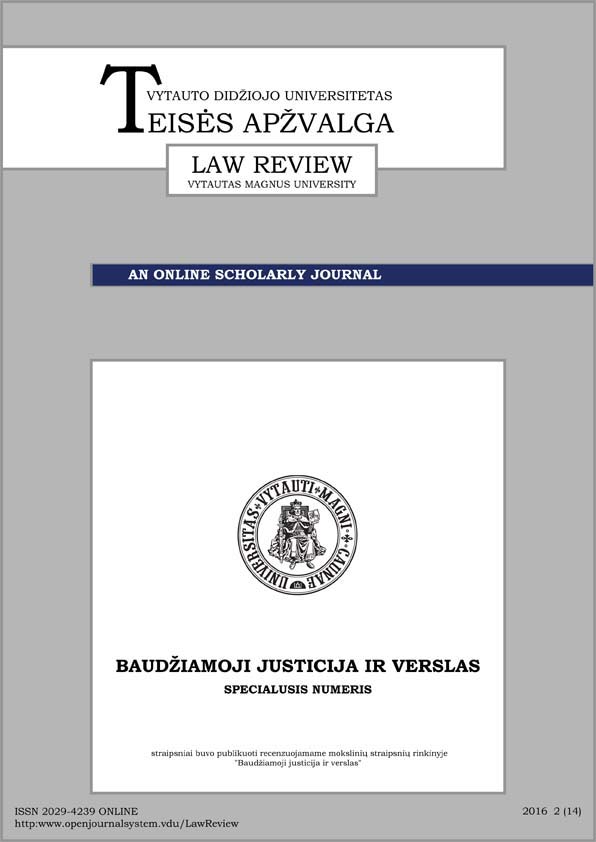Atskiri Lietuvos Respublikos Konstitucinio Teismo įtakos baudžiamajai justicijai aspektai
Individual Aspects of the Impact of the Constitutional Court of the Republic of Lithuania to the Criminal Law
Author(s): Edita GruodytėSubject(s): Law, Constitution, Jurisprudence, Criminal Law
Published by: Vytauto Didžiojo Universitetas
Keywords: Criminal justice; Jurisprudence of the Constitutional Court; Legal principles; Principle of justice
Summary/Abstract: Šio straipsnio tikslas – pabandyti ištirti, kiek ir kokiais aspektais Lietuvos Respublikos Konstitucinio Teismo jurisprudencijoje buvo nagrinėjami tiesiogiai su baudžiamąja teise (tik materialiąja) susiję klausimai, bei įvertinti tiek realią šio teismo įtaką atskleidžiant baudžiamosios teisės normų turinį, tų baudžiamųjų normų atitiktį Konstitucijai ir jos „dvasiai“, tiek konstitucinės jurisprudencijos poveikį įstatymo leidėjui. After the restoration of independence, the Constitutional Court of the Republic of Lithuania (hereinafter – the Constitutional Court) has been operating for 22 years and has certain impact both to the legislator and the implementation of justice. The goal of the article is to analyse to what extent and in what aspects the Constitutional Court jurisprudence has dealt with Lithuanian criminal law (only the material one) issues. This aim is realised in two stages. The main function of the Constitutional Court is checking the constitutionality of legal acts which is discussed in the first section of the article through the analysis of the rulings of the Constitutional Court in which certain norms of the Criminal code were declared unconstitutional. The next, not less important, impact of the Constitutional Court to the criminal law is through the formation of the constitutional doctrine which is discussed in the second part of the article.It was concluded that during the analysed period only nine resolutions of the Constitutional Court were devoted to the questions of material criminal law, i.e. on the average, less than one resolution every two years, which in itself shows the relatively low direct impact of the Constitutional Court. During the researched period, one third of the cases, i.e., three rulings concerning certain norms of Penal Code (provision of death penalty for intentional murder with aggravating circumstances; inflexibility of the Criminal Code- lack of judicial discretion in provision of the kind and the extent of criminal penalties; the possibility to apply retroactively the norm of genocide for social and political groups) were recognized as unconstitutional.The analysis of the decisions of the Constitutional Court revealed that in the all nine legal documents important aspects both for the practical application of the norms of the Criminal Code and for the legislator are addressed and are taken into consideration in deciding criminal cases, adjusting the norms of criminal code and are discussed by academics.Through the analysis of the rulings of the Constitutional Court and some examples of the decisions of the Supreme Court in criminal cases, it was concluded that ideas of constitutionalism are gradually gaining more power in the case law, the courts are adopting not only formally legitimate, but also justice implementing decisions. However, it should be stated that both the legislator and the courts should aspire that each interpretation of the criminal norms and especially enactment of new criminal norms would be evaluated from the perspective of the Constitutional norms and the fundamental principles, as “Seimas” (legislator) as well as other public authorities are directly bound by the Constitution which we sometimes lack in reality.
Journal: Teisės apžvalga
- Issue Year: 2016
- Issue No: 2(14)
- Page Range: 98-114
- Page Count: 17
- Language: Lithuanian

